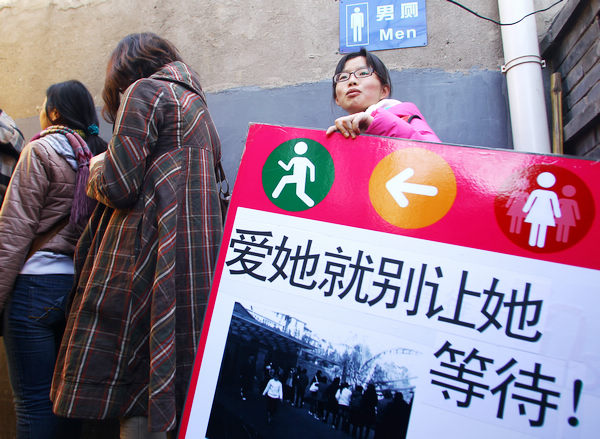Toilet occupation group is flushed with success
Updated: 2012-02-27 07:14
By Xu Lin and Li Wenfang (China Daily)
|
|||||||||||
Women demanding more public facilities make their voice heard
BEIJING / GUANGZHOU - Wang Lailin, 20, a university student from Zhengzhou, in Central China's Henan province, felt the first flush of success after she used the men's toilet in Beijing.
"Women were waiting outside and some were using the men's toilet. So I followed them. It was quicker and I saved time as I had a train to catch," she said.
|
 |
|
Women line up outside a men's toilet in Beijing on Sunday in a campaign that calls for more facilities for women. "If you love her, don't let her wait in line," reads the sign. [Zou Hong / China Daily] |
Wang is one of those who benefited from the "Occupy Men's Toilet" group, which wants more public conveniences for women.
Female students in Beijing on Sunday occupied cubicles in the men's toilet near Deshengmen. Their purpose was to make sure that women who were waiting outside could use the facilities first. Volunteers outside the toilet held banners demanding "More conveniences for women, more gender equality", and "If you love her, don't let her wait in line".
"It's more difficult for women to answer the call of nature than for men as there are insufficient public women's toilets and the time women spend in the toilet is two or three times that of men," said organizer Li Tingting, 23, a university student from Beijing.
Li staged the first occupation on Feb 19 at a public toilet in Guangzhou, and set off a fierce public debate.
The urban management commission of Guangzhou responded last week. It said that since March, new and renovated women's toilet cubicles in Guangzhou have been required to cover an area at least 1.5 times that of a men's cubicle. Colleges and universities in Guangzhou have already enlarged women's cubicles.
Similar incidents can be traced back to 1996 in Taiwan. Following a protest by a group of female college students, toilet cubicles for women were enlarged.
According to an online survey on Sina Weibo about 84 percent of netizens, out of 2,824 who replied, were in favor of building more public toilets for women, while 9 percent were against it.
The occupation is on a temporary basis out of understanding for men's needs.
"We only occupy the men's restroom for 3 minutes, holding it for women who are in a hurry to go to the toilet. A new round of 'occupation' follows 10 minutes later. Men also need to use the facilities. Volunteers explain to passers-by just what is happening," Li said.
Li was adamant that the occupations are not anti-male.
Men also have mothers, wives and daughters, and they have to wait for their loved ones outside toilets, she said.
However, an elderly man in his 70s, who declined to be named, was angry at the occupation.
"How could you do this? Men's toilets are built for men, not for women. What if a man wants to go to the toilet? It's over the top," he said.
Guo Jianmei, a public interest lawyer specializing in rights for women and children, saw it differently. "It's more than an act. We should respect women's rights. China has rules about public toilets but it's difficult to carry them out."
Guo said she is drafting a proposal on how to implement the rules, and would talk to some national legislators and political advisers.
In Beijing, the size ratio of men's and women's toilet cubicles is 1:1.5. But Li said the proportion should be 1:2 not just in Beijing but nationally, and unisex toilets should be promoted.
"Architects have to estimate how many people use a cubicle," said Jiang Zhongguang, a professor from the Urban Research Center at Beijing University of Civil Engineering and Architecture.
"We should also consider rush hour and off-peak hours. Increasing cubicle size means more investment," Jiang said.
The number of women's cubicles should be increased in some places, such as shopping malls, because women go shopping more often than men, he said.
The cost of rebuilding urinals into unisex cubicles is not expensive, he said, but pointed out that they are only suitable in some places and there are issues of safety.
"Taiwan is promoting unisex toilets and there is an alarm in each cubicle to avoid sexual harassment. I think that is a good idea," Li said.
Cui Xuan, deputy chief of the environmental sanitation division at the Beijing municipal commission of city administration and environment, said the issue was important.
"Unisex toilets are convenient for those who have to look after the physically challenged, the elderly or kids. Beijing has these toilets, mostly in urban areas."
Related Stories
Women 'occupy' men's toilets in equality protest 2012-02-20 10:54
Campaign for more toilets 2011-08-12 09:18
Toilet-themed eatery in Chongqing 2011-02-22 13:12
Residents fret over Shanghai's toilets 2012-02-06 07:53
Hot Topics
Wu Ying, iPad, Jeremy Lin, Valentine's Day, Real Name, Whitney Houston, Syria,Iranian issue, Sanyan tourism, Giving birth in Hong Kong, Cadmium spill, housing policy
Editor's Picks

|

|

|

|

|

|







